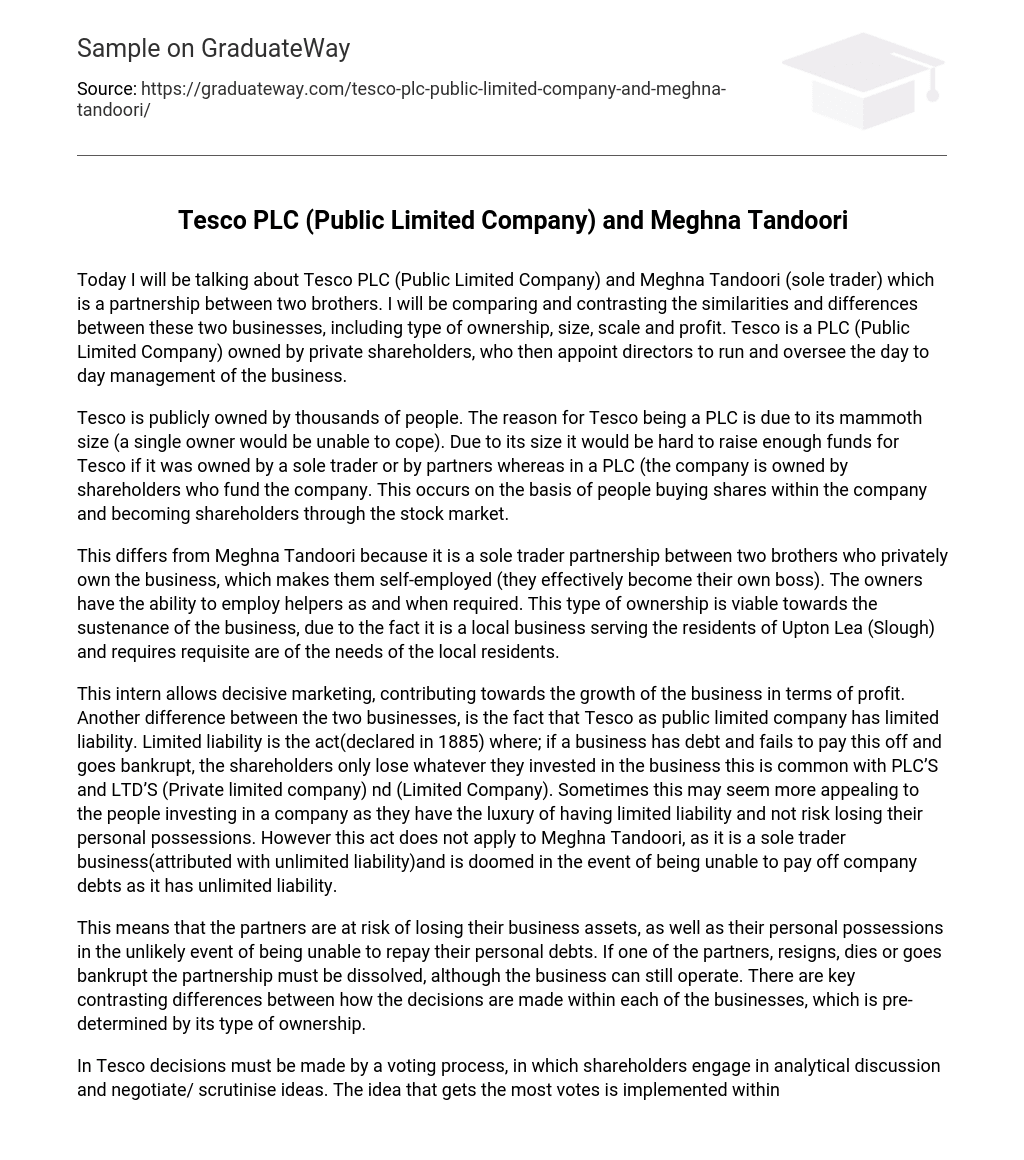Today I will be talking about Tesco PLC (Public Limited Company) and Meghna Tandoori (sole trader) which is a partnership between two brothers. I will be comparing and contrasting the similarities and differences between these two businesses, including type of ownership, size, scale and profit. Tesco is a PLC (Public Limited Company) owned by private shareholders, who then appoint directors to run and oversee the day to day management of the business.
Tesco is publicly owned by thousands of people. The reason for Tesco being a PLC is due to its mammoth size (a single owner would be unable to cope). Due to its size it would be hard to raise enough funds for Tesco if it was owned by a sole trader or by partners whereas in a PLC (the company is owned by shareholders who fund the company. This occurs on the basis of people buying shares within the company and becoming shareholders through the stock market.
This differs from Meghna Tandoori because it is a sole trader partnership between two brothers who privately own the business, which makes them self-employed (they effectively become their own boss). The owners have the ability to employ helpers as and when required. This type of ownership is viable towards the sustenance of the business, due to the fact it is a local business serving the residents of Upton Lea (Slough) and requires requisite are of the needs of the local residents.
This intern allows decisive marketing, contributing towards the growth of the business in terms of profit. Another difference between the two businesses, is the fact that Tesco as public limited company has limited liability. Limited liability is the act(declared in 1885) where; if a business has debt and fails to pay this off and goes bankrupt, the shareholders only lose whatever they invested in the business this is common with PLC’S and LTD’S (Private limited company) nd (Limited Company). Sometimes this may seem more appealing to the people investing in a company as they have the luxury of having limited liability and not risk losing their personal possessions. However this act does not apply to Meghna Tandoori, as it is a sole trader business(attributed with unlimited liability)and is doomed in the event of being unable to pay off company debts as it has unlimited liability.
This means that the partners are at risk of losing their business assets, as well as their personal possessions in the unlikely event of being unable to repay their personal debts. If one of the partners, resigns, dies or goes bankrupt the partnership must be dissolved, although the business can still operate. There are key contrasting differences between how the decisions are made within each of the businesses, which is pre-determined by its type of ownership.
In Tesco decisions must be made by a voting process, in which shareholders engage in analytical discussion and negotiate/ scrutinise ideas. The idea that gets the most votes is implemented within the business depending on the location it affects (e. g. improving the quality of customer service within a specific store. ) is a downside of Public Limited Companies as ideas and solutions cannot be implemented speedily as all the shareholders are entitled to the views and opinions as they all have a stake within the business it’s not owned outright by one single individual).
But due to Meghna Tandoori being a sole partnership decisions can be made quicker and is a strength of the business, as if there are problems, such as bad quality of service they can resolve it within a quick time frame; meaning less impact on business profit (as a decision can be put in i. e. training for waiters/waitresses or hiring/firing). Both businesses share similar purposes as they both sell goods and services; their main objective is to make profit. Tesco sells a wide variety of products such as groceries, electrical goods and clothes.
They also provide services such as insurance, credit card services and mobile broadband. Meghna Tandoori also provides products in the form of the food their customers purchase. They also give their customers service; waiting service providing customer care by taking orders and providing food. However there are major differences regarding the size and scale of both businesses as Tesco is a large business that employs 240,000 employees in the UK and a further 440,000 worldwide.
It is multinational and operates within 14 countries such as UK, China, Poland and Thailand. It is actively seeking to become the number 1 supermarket in all the countries it operates in by securing a firm business model that can attract to the majority of the population. Meghna Tandoori is a stark contrast as it is a small business that barley employs 10 people. It is working on a small scale and targets the local population of Slough within the post code SL2.
The reason for the difference in size and scale is because of the different financial capacities the owners have, which affects their ability to expand and become more successful. However Meghna tandoori is doing well as a sole trader as it has been running for over 17 years which is testimony to the partnership between two local brothers. Both businesses have similar principles on the distribution of their profit amongst the owners. In Tesco each shareholder receives a proportion of the profit, which largely depends on the size of their share within the business.
E. g. if someone has 2% they will receive a smaller amount of profit compared to someone who has a 40% share. A similar process takes place at Meghna Tandoori, where the owners (partnership between two brothers) splits profit 50-50. This is effective because everyone gets an equal share of money( in the case of Tesco, in retrospect of the amount you invested/ value of your share or your percentage stake. ). In Tesco only shareholders, not directors receive profit; whereas in Meghan Tandoori the profit is split 50-50.





